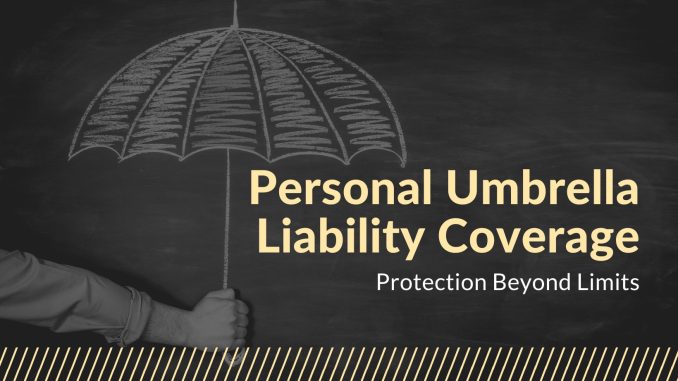
In the world of insurance, most people are familiar with the basics—auto, home, health, and perhaps life coverage. These policies form the bedrock of personal and business protection, offering financial support when things go wrong. But what happens when the unexpected exceeds those limits? That’s where umbrella policies come into play. Often overlooked, umbrella insurance provides an extra layer of security that can make a critical difference when standard coverage falls short. It’s not just about having more insurance—it’s about having smarter, broader protection that anticipates the unpredictable.
Umbrella policies are designed to kick in when the liability limits of your underlying policies have been exhausted. Imagine you’re involved in a car accident where the damages and injuries total $700,000, but your auto policy only covers up to $300,000. Without umbrella coverage, you’d be responsible for the remaining $400,000—a potentially devastating financial burden. With an umbrella policy, that excess amount is covered, shielding your assets and preserving your financial stability. This kind of protection is especially valuable in today’s litigious environment, where lawsuits and settlements can quickly escalate beyond what most people expect.
The beauty of umbrella insurance lies in its versatility. It doesn’t just extend the limits of one policy—it can apply across multiple areas of liability. For individuals, this might include auto, homeowners, and even watercraft insurance. For business owners, it can supplement general liability, commercial auto, and employer liability coverage. This broad applicability means that a single umbrella policy can serve as a catch-all for various risks, simplifying your insurance portfolio while enhancing your overall protection. It’s a strategic move that reflects a proactive approach to risk management.
Another compelling aspect of umbrella coverage is its affordability relative to the protection it offers. Because it only activates after primary policies have been exhausted, the risk to the insurer is lower, which translates into more favorable premiums. For a relatively modest cost, policyholders can secure millions of dollars in additional liability coverage. This cost-effectiveness makes umbrella insurance an attractive option for those who want to safeguard their assets without significantly increasing their insurance budget. It’s a way to achieve peace of mind without compromising financial goals.
Umbrella policies also serve as a safeguard against the unexpected nuances of liability. Not all risks are easily categorized, and sometimes incidents arise that fall into gray areas. For example, if you’re accused of defamation or invasion of privacy—claims that may not be fully covered under standard homeowners or auto policies—an umbrella policy can provide the necessary support. These scenarios may seem unlikely, but in an age of social media and heightened sensitivity to personal rights, they’re becoming more common. Having coverage that accounts for these possibilities is not just prudent—it’s essential.
For high-net-worth individuals, umbrella insurance is often a cornerstone of asset protection. When significant wealth is at stake, the potential exposure from lawsuits or liability claims increases. A single incident could jeopardize years of financial planning, investments, and personal property. Umbrella coverage acts as a buffer, ensuring that personal assets remain intact even in the face of substantial claims. But it’s not just for the wealthy. Anyone with savings, property, or future earnings to protect can benefit from the added security that umbrella insurance provides.
Businesses, too, can gain from the strategic use of umbrella policies. As companies grow, so do their liabilities. A small oversight, a workplace accident, or a customer injury can lead to claims that exceed standard policy limits. Umbrella insurance allows businesses to operate with confidence, knowing that they have a safety net in place. It also supports long-term planning, enabling leaders to focus on growth and innovation rather than constantly worrying about worst-case scenarios. In this way, umbrella coverage becomes part of a broader risk management strategy—one that supports resilience and sustainability.
Understanding the terms and conditions of an umbrella policy is crucial to maximizing its benefits. While it offers broad protection, it’s not unlimited. Policyholders must ensure that their underlying coverage meets the minimum requirements set by the umbrella insurer. Additionally, exclusions may apply, and it’s important to clarify what is and isn’t covered. Working with a knowledgeable advisor can help navigate these details, ensuring that the policy is structured effectively and integrated seamlessly with existing coverage. This kind of guidance transforms umbrella insurance from a generic add-on into a tailored solution.
Ultimately, the power of umbrella policies lies in their ability to provide comprehensive, cost-effective protection against the unpredictable. They extend the reach of your existing coverage, fill in critical gaps, and offer peace of mind in a world where liability risks are increasingly complex. Whether you’re an individual looking to protect your family’s future or a business owner safeguarding your enterprise, umbrella insurance offers a smart, strategic way to prepare for the unexpected. It’s not just about having more coverage—it’s about having the right coverage, in the right place, at the right time. And that kind of foresight is what turns insurance from a necessity into a true asset.